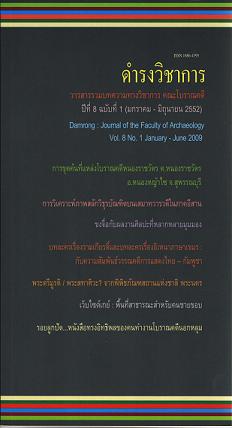CONFUCIANISM AND THAI ARTS
Keywords:
ขงจื้อ, ศิลปกรรมAbstract
Confucianism as a Chinese ethical and philosophy system has become an important role in political, social, and philosophical in China around 2,000 tears. The Philosophy of Confucianism focuses on Social Organization and Human Morality. The concept of Confucianism not only influenced on the actualization but also influenced in term of visualization in many aspects of Arts such as Mural Paintings, Architecture, and Decorative Arts Design. Because of the influential Confucianism, Thai Arts has also been affected.
References
จำนงค์ ทองประเสริฐ (แปล). บ่อเกิดลัทธิประเพณีจีน. ภาคหนึ่งและสอง. พิมพ์ที่โรงพิมพ์ส่วนท้องถิ่น กรมการปกครอง: พระนคร. 2510
มาลินี คัมภีรญาณนนท์. “จิตรกรรมจีน” เอกสารคำสอน รายวิชา 310324 สื่อการสอนประเภท Powerpoint เผยแพร่ที่ภาควิชาประวัติศาสตร์ศิลปะ คณะโบราณคดี มหาวิทยาลัยศิลปากร กรุงเทพฯ 2551
มาลินี คัมภีรญาณนนท์. ตามรอยมรดกวัฒนธรรมจีนในสมัยรัตนโกสินทร์ตอนต้น: มุมมองจากจิตรกรรมฝาผนัง. งานวิจัย ได้รับทุนอุดหนุนจากสถาบันวิจัยและพัฒนา มหาวิทยาลัยศิลปากร ประจำปีงบประมาณ 2547 กรุงเทพฯ: ศักดิโสภาการพิมพ์, 2550
มาลินี คัมภีรญาณนนท์. ศิลปะจีน: ยุคสัมฤทธิ์ในประเทศจีน. ตำรา. กรุงเทพฯ: ภาควิชาประวัติศาสตร์ คณะโบราณคดี มหาวิทยาลัยศิลปากร 2551
อาร์ซี เจ บาห์ม (เขียน). ครองแผน ไชยธนะสาร (แปล). หลักคำสอนของขงจื้อ. กรุงเทพฯ: สนพ. เดลฟี, 2521
Sickman, Laurence and soper Alexander. Art and architecture of China. Harmondsworth, Middlesex: Penguins Book Ltd. 1971
Li Zehou. The Path of Beauty. The People’s republic of china, Beijing, 1988
Qu Chunli. The life of Confucius. Foreign Language press: Beijing, 1996
Downloads
Issue
Section
License
บทความนี้เป็นผลงานของข้าพเจ้าแต่เพียงผู้เดียว และ/หรือเป็นผลงานของข้าพเจ้าและผู้ร่วมงาน ตามชื่อที่ระบุในบทความจริง และเป็นผลงานที่มิได้ถูกนำเสนอหรือตีพิมพ์ที่ใดมาก่อน





